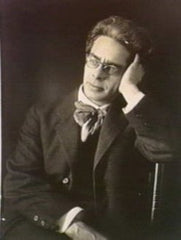Fritz Hart - Australian Heritage Series
 Fritz Bennicke Hart (1874-1949), composer, conductor and teacher, was born on 11 February 1874 at Greenwich, England. Hart became a chorister at Westminster Abbey where he remained for three years under the directorship of Sir Frederick Bridge. In 1893-96 he was a student at the Royal College of Music. His friends there included the composers Gustav Holst, Coleridge Taylor, William Hurlstone; later friends were Ralph Vaughan Williams and John Ireland.
Fritz Bennicke Hart (1874-1949), composer, conductor and teacher, was born on 11 February 1874 at Greenwich, England. Hart became a chorister at Westminster Abbey where he remained for three years under the directorship of Sir Frederick Bridge. In 1893-96 he was a student at the Royal College of Music. His friends there included the composers Gustav Holst, Coleridge Taylor, William Hurlstone; later friends were Ralph Vaughan Williams and John Ireland.
After graduating Hart toured and acted for eighteen months with a dramatic company; this led to writing incidental music for Julius Caesar. His first opportunity to conduct came at Eastbourne where he directed his own music for Romeo and Juliet. His next few years as musical director with various touring companies gave him a range of experience from operettas and musical comedy to dramatic incidental music and opera.
In 1909 Hart came to Australia when J. C. Williamson offered him an engagement for twelve months. It was extended to four years. In 1913, when G. W. L. Marshall-Hall went to London, Hart assumed his lecturing duties at the Conservatorium of Music, Melbourne. A year later Marshall-Hall sent instructions to close the conservatorium, but the remaining staff refused to resign and made Hart their director. In 1915 Marshall-Hall was reinstated as Ormond professor of music at the University of Melbourne, thus returning as a rival to his former institution. Amalgamation proved impossible, even after Marshall-Hall's death in July 1915. Anti-German feeling provoked by World War I isolated Marshall-Hall and his largely German-born staff from the popular Albert Street conservatorium under Hart, whose extravagantly pro-British ally (Dame) Nellie Melba threw in her lot with Albert Street, founding there her school of singing.
Melba and her pupils shaped Hart's work as a composer in his choice of vocal forms, though the Celtic revival and the poetry of Herrick also influenced him. Eighteen of his twenty-two operas, 267 of his 514 listed songs (he destroyed several hundred more) and three of his four large choral works were composed in Melbourne. Fifteen orchestral works, including one symphony, numerous chamber and solo instrumental works, unaccompanied choruses, part-songs, transcriptions and arrangements are among his remaining output.
In 1913 Hart and Alfred Hill founded the short-lived Australian Opera League whose first programme on 3 August 1914 included the first performance of Hart's opera Pierrette. Six other operas were staged in his lifetime.
In March 1924 Hart was made a fellow of the Royal College of Music, London. In 1927 he became acting conductor for the Melbourne Symphony Orchestra, and in 1928 permanent conductor. Late in 1932 the Melbourne University Conservatorium Orchestra and the M.S.O. amalgamated under the joint conductorship of Hart and Professor (Sir) Bernard Heinze.
Meanwhile in December 1931 Hart was invited to Hawaii as guest conductor of the Honolulu Symphony Orchestra. In 1937 he accepted the posts of permanent conductor of the Honolulu Symphony Orchestra and first professor of music at the University of Hawaii. As described by his contemporaries, Hart was quick in all his movements and had a deep, resonant voice; he was a skilled raconteur. He died on 9 July 1949 at Honolulu and survived by his son and his second wife.
Australian Dictionary of Biography
See all works by Fritz Hart in our shop
